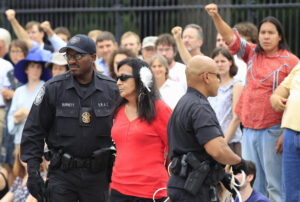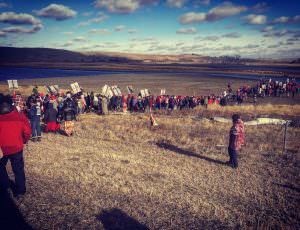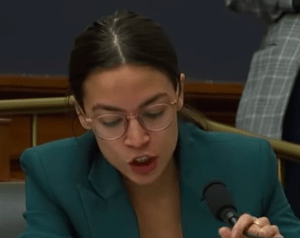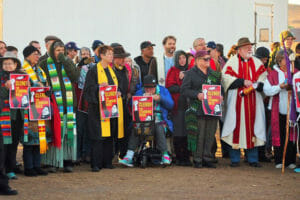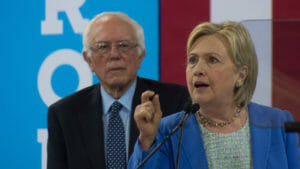Dakota Access Pipeline Protests Reflect a Nationwide Search for Justice
The Truthdig team sat down with documentary filmmaker Josh Fox to discuss the criminalization of journalists documenting the protests in North Dakota, the election and the troubling state of American democracy.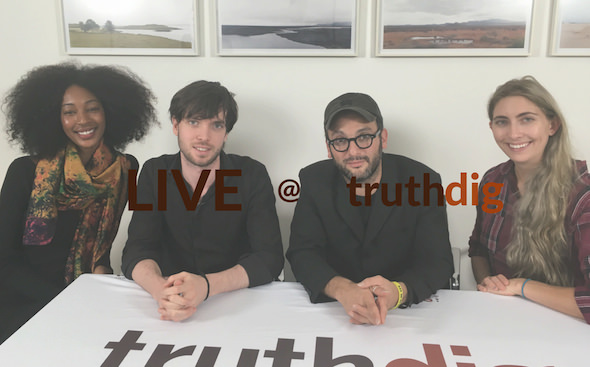
From left: Sarah Wesley, Donald Kaufman, Josh Fox and Emma Niles.
On Thursday, the Truthdig team sat down with documentary filmmaker and environmental activist Josh Fox to discuss the impact of the Dakota Access Pipeline protests.
“We need an outpouring of support for journalists who are doing jail time” for protesting, Fox said.
Over the weekend, 127 people were arrested at the construction site of the proposed Dakota Access oil pipeline. Since the demonstrations began this summer, more than 260 people have been arrested.
Among those facing legal retribution for demonstrating alongside members of the Standing Rock Sioux tribe is Democracy Now! journalist Amy Goodman, who was initially brought up on “riot” charges, although those charges were later dropped. Actress Shailene Woodley made mainstream media headlines when she was arrested earlier in October during a peaceful protest—a process she streamed live onto her Facebook page. And award-winning documentary filmmaker Deia Schlosberg could face decades in prison for documenting the protests.
There’s a common thread linking Goodman, Woodley and Schlosberg: Each incurred criminal charges after documenting the protests in some form. Woodley, during her Facebook live stream, said she is being singled out by law enforcement “because I have 40,000 people watching.” Goodman, speaking after her own charges were dismissed, declared that “the state’s attorney was attempting to stop journalism.”
Schlosberg, however, faces the highest consequences for filming protesters earlier in October: up to 45 years of jail time. The Guardian reports:
Schlosberg, a New York-based film-maker, is facing three felony conspiracy charges for filming protesters on 11 October at a TransCanada Keystone Pipeline site in Pembina County in North Dakota, with prosecutors alleging that she was “recruited to record the criminal activity”.
Schlosberg recently spoke with Goodman on Democracy Now! and explained the charges against her. “Conspiracy—they were all conspiracy charges: conspiracy to theft of public—theft of property; conspiracy to theft of service; and conspiracy of interfering with a public—a critical public infrastructure.” She outlines the situation that led to her arrest:
I was filming the action. I was on public land. I was on a public road and at no point trespassed, at no point, you know, broke in or destroyed any property. I had nothing to do with the planning of the event. I was there to document it. I think it’s essential for journalists to—journalists and filmmakers to go where the mainstream media is not. And there’s a major hole in the coverage of climate change and people that are already dealing with the consequences of climate change and people that are fighting climate change. So, I take that responsibility very seriously.
Filmmaker Josh Fox, whose documentary, “How to Let Go of the World and Love All the Things Climate Can’t Change,” was produced by Schlosberg, has been vocal about her arrest and what it means for a free press.
“Never did I ever think that the biggest threat to her life, of her livelihood, would be the United States government and our police force,” Fox told Goodman on Democracy Now!. He calls the charges against Schlosberg, Goodman and Woodley a “brutal repression of the media” and explains how police are infringing on constitutional rights. “These people are not accessories to the crime. They are the media,” he says. “This is a First Amendment, constitutionally protected activity.”
Fox continues:
It makes me terrified for the future of our profession. We need to be able to operate as documentarians. We need to be able to operate as independent media that are allowed to bring these stories to the public. And it’s constitutionally protected. And we won’t rest.
Many have rallied behind Schlosberg by signing an open letter that Fox wrote to President Obama. “Journalism, especially documentary filmmaking, is not a crime, it’s a responsibility,” Fox wrote. Celebrities Neil Young, Mark Ruffalo and Daryl Hannah are among those who have signed their names to the letter.
How can journalists protect their First Amendment rights? What do the hundreds of arrests say about the state of American democracy?
Groundbreaking technology has also been used to cover the protests. New media such as Facebook Live and Twitter give an on-the-ground, direct look into the demonstrations. Over the weekend, law enforcement shot down a drone used by the protesters to document their interactions with police. How does new technology play a role in journalism and freedom of the press?
You can watch past editions of “Live at Truthdig” on our YouTube page.
—Posted by Emma Niles
Independent journalism is under threat and overshadowed by heavily funded mainstream media.
You can help level the playing field. Become a member.
Your tax-deductible contribution keeps us digging beneath the headlines to give you thought-provoking, investigative reporting and analysis that unearths what's really happening- without compromise.
Give today to support our courageous, independent journalists.
